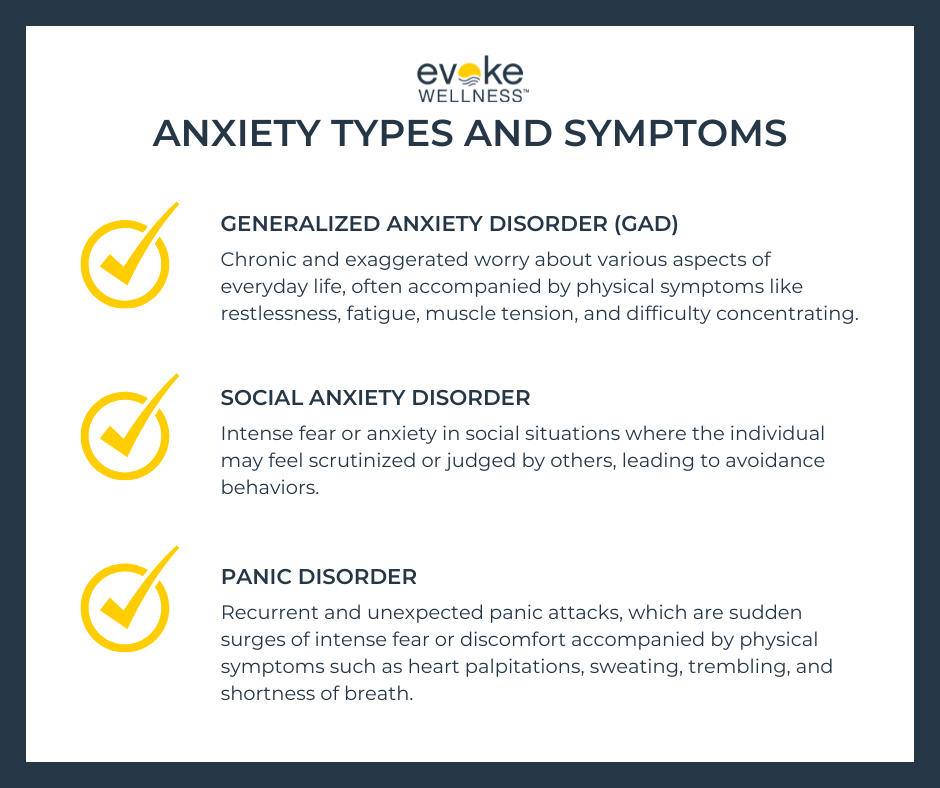As you navigate the complex landscape of mental health and addiction, understanding the intricate relationship between substance abuse and anxiety is crucial. Recent studies indicate that approximately 20% of individuals with substance use disorders also suffer from anxiety disorders. This dual diagnosis presents unique challenges in treatment and recovery. At Evoke Wellness at Hilliard, we recognize the importance of addressing both issues simultaneously. Our comprehensive approach integrates mental health treatment, substance use therapy, and specialized dual diagnosis programs to provide you with the most effective path to recovery. By exploring the underlying connections between anxiety and addiction, you can gain valuable insights into your own experiences and take proactive steps towards lasting healing and wellness.
Together, let’s embrace the journey to recovery and the promise of a new beginning. Call us at (833) 949-1347 today or reach out online.
What Are Anxiety Disorders?
Anxiety disorders are a group of mental health conditions characterized by persistent and excessive worry, fear, or anxiousness that significantly interferes with daily life and functioning. According to statistics from the Anxiety & Depression Association of America, anxiety disorders affect over 40 million adults in the U.S. each year, making them the most common mental health issue nationwide.
Causes and Risk Factors
The exact causes of anxiety disorders are not fully understood, but they are believed to be influenced by a combination of genetic, environmental, and psychological factors. Some potential risk factors include:
- Family history and genetics
- Brain chemistry imbalances
- Stressful or traumatic life events
- Certain medical conditions or substance abuse
- Personality traits like shyness or behavioral inhibition
While anxiety disorders can be debilitating, effective treatment is available. A comprehensive approach combining psychotherapy, medication, and lifestyle changes can help individuals manage their symptoms, develop coping strategies, and improve their overall well-being.
The Connection Between Anxiety and Substance Misuse
A Vicious Cycle of Coping
For many individuals, anxiety and substance misuse form a vicious cycle. Anxiety disorders can lead people to turn to substances like alcohol or drugs in an attempt to self-medicate and cope with their symptoms. This temporary relief, however, often leads to dependence and addiction, which in turn exacerbates anxiety levels due to the effects of withdrawal.
Dual Diagnosis: Tackling Both Issues
Addressing both anxiety and substance abuse simultaneously is crucial for long-term recovery. This approach, known as dual diagnosis treatment, recognizes the interconnectedness of these conditions and aims to break the cycle by treating the root causes. Comprehensive programs incorporate evidence-based therapies, medication management, and holistic practices to support both mental and physical healing.
Building Emotional Resilience
Developing healthy coping mechanisms and emotional resilience is key to managing triggers and preventing relapse. Therapies like Cognitive Behavioral Therapy (CBT) and Dialectical Behavior Therapy (DBT) equip individuals with strategies to identify and change negative thought patterns, improve emotional regulation, and build a strong foundation for long-term sobriety.
A Comprehensive Approach
At Evoke Wellness at Hilliard, our anxiety treatment program takes a comprehensive, integrated approach to addressing anxiety and co-occurring substance abuse disorders. Our team of experts creates personalized treatment plans that combine evidence-based therapies, medication management, and holistic practices to support clients on their journey to lasting recovery.
The Impact of Substance Abuse on Anxiety Symptoms
Vicious Cycle of Substance Use and Anxiety
Substance abuse and anxiety disorders often form a vicious cycle – drugs and alcohol may provide temporary relief from anxiety symptoms, but prolonged use can exacerbate anxiety and other mental health issues. This self-medication approach ultimately worsens both conditions over time, making effective treatment crucial.
Substances Commonly Linked to Anxiety
While various substances like alcohol, opioids, benzodiazepines, stimulants, and hallucinogens can contribute to anxiety, research shows alcohol is particularly problematic for mental health. As a depressant, alcohol negatively impacts emotional well-being, leading to irritability, mood swings, isolation, and impaired cognitive function – issues that can fuel or exacerbate anxiety disorders.
Detox and Withdrawal Effects
Attempting to quit substances alone can trigger intense anxiety and other psychological withdrawal symptoms like mood swings, depression, sleep disturbances, and cravings. Up to 80% experience these effects during detox, underscoring the importance of professional, medically-supervised detox and counseling to manage the emotional challenges safely.
Dual Diagnosis Treatment Necessity
With the high rates of co-occurring substance use and anxiety disorders, treating both issues concurrently through an integrated dual diagnosis approach is vital for recovery. Comprehensive programs combine evidence-based therapies like CBT and DBT, medication management, counseling, and holistic activities to promote emotional resilience and lasting sobriety while addressing root causes.
Treating Anxiety and Co-Occurring Substance Use Disorders
Integrated Treatment Approach
Effectively treating co-occurring anxiety and substance use disorders requires an integrated approach that addresses both conditions simultaneously. This dual diagnosis treatment combines evidence-based therapies, medication management, and support services tailored to each individual’s unique needs.
Therapy for Dual Diagnosis
Cognitive-behavioral therapy (CBT), dialectical behavior therapy (DBT), and acceptance and commitment therapy (ACT) are commonly used to help clients develop coping strategies for managing anxiety and substance cravings. Individual, group, and family therapy sessions provide a supportive environment to explore underlying issues and build resilience.
Medications for Co-occurring Disorders
Depending on the severity of symptoms, medications may be prescribed to alleviate anxiety, stabilize mood, and reduce cravings. Medication-assisted treatment, such as Vivitrol or Suboxone, can aid in managing withdrawal and preventing relapse during early recovery.
Addressing Underlying Issues
Dual diagnosis treatment recognizes the interconnectedness of mental health and substance abuse. Addressing psychological factors, such as trauma, depression, or other co-occurring disorders, is crucial for achieving lasting sobriety and emotional well-being.
Continuum of Care
Recovery is an ongoing journey, and a continuum of care is essential for maintaining progress. After initial treatment, individuals may transition to outpatient programs, support groups, and ongoing therapy to reinforce coping skills and prevent relapse.
Helping a Loved One with Anxiety and Substance Misuse
Recognizing the Signs
Identifying the signs of co-occurring anxiety and substance abuse disorders is the first step in supporting your loved one’s recovery. Look for physical symptoms like tremors, sweating, and insomnia that could indicate substance misuse. Psychological signs like persistent worry, irritability, and mood swings may point to an underlying anxiety disorder. Behavioral changes like social withdrawal, missed obligations, and secrecy around substance use are also red flags.
Encouraging Treatment
Overcoming the dual challenges of anxiety and addiction requires comprehensive professional care. Urge your loved one to seek help from a dual diagnosis treatment program designed to address both conditions simultaneously. These evidence-based programs combine therapies like cognitive-behavioral therapy with medication management and holistic approaches like mindfulness to promote lasting recovery.
Providing Compassionate Support
As your loved one begins treatment, your unconditional support can make a significant difference. Offer empathy and validation for the difficulties they face, while avoiding judgment or criticism. Assist with practical matters like transportation or childcare to reduce stress. Most importantly, celebrate each milestone achieved on the path to healing.
Helping someone navigate anxiety and substance misuse requires patience and perseverance. By recognizing the signs, encouraging professional treatment, and offering compassionate support, you can guide your loved one toward a healthier, more fulfilling life in recovery.
The Link Between Substance Abuse and Anxiety: FAQs
Substance Use & Anxiety: A Vicious Cycle
Anxiety disorders and substance abuse often go hand-in-hand, creating a complex and vicious cycle. According to the Anxiety & Depression Association of America, around 20% of those with an anxiety or mood disorder also struggle with substance abuse. Individuals may turn to drugs or alcohol to cope with overwhelming anxiety symptoms, but this self-medication only provides temporary relief and ultimately exacerbates the underlying mental health condition.
Conversely, long-term substance abuse can rewire the brain’s chemistry, increasing susceptibility to anxiety disorders. A study published in the journal Addiction found that individuals with substance use disorders are nearly twice as likely to develop an anxiety disorder compared to the general population.
Recognizing the Signs
Early recognition of co-occurring anxiety and substance abuse is crucial. Common signs may include:
- Persistent feelings of worry, fear, or unease
- Difficulty sleeping or concentrating
- Physical symptoms like rapid heartbeat or muscle tension
- Increased substance use to self-medicate anxiety symptoms
- Withdrawal symptoms when not using substances
Integrated Treatment Approach
Effective treatment for co-occurring anxiety and substance abuse disorders requires an integrated approach that addresses both issues simultaneously. Evoke Wellness at Hilliard offers a comprehensive Dual Diagnosis Treatment Program that combines evidence-based therapies like Cognitive Behavioral Therapy (CBT) and Dialectical Behavior Therapy (DBT) with medication management and holistic wellness practices.
This multidisciplinary approach helps individuals develop healthy coping mechanisms, regulate emotions, and achieve lasting recovery from both disorders. Support groups and aftercare planning ensure ongoing support for sustained progress.
Seeking Professional Help
If you or a loved one is struggling with anxiety and substance abuse, it’s crucial to seek professional help. Evoke Wellness at Hilliard offers a compassionate and comprehensive Anxiety Treatment Program that can provide the specialized care needed to break free from this debilitating cycle.
Remember, recovery is possible with the right support and treatment approach. Reach out today to begin your journey towards a healthier, more fulfilling life.
Conclusion
In conclusion, the intricate relationship between substance abuse and anxiety demands a comprehensive approach to treatment. By addressing both issues simultaneously through dual diagnosis programs, you can achieve lasting recovery and improved mental health.
Recent studies show that individuals who receive integrated treatment for co-occurring disorders are 1.5 times more likely to maintain sobriety after one year compared to those treated for substance use alone. By seeking professional help and committing to a holistic treatment plan, you can break free from the cycle of anxiety and addiction, paving the way for a healthier, more fulfilling life.
Begin Your Journey with Evoke Wellness at Hilliard
If you or a loved one is considering treatment, Evoke Wellness at Hilliard invites you to contact us. Our compassionate team is ready to answer your questions, discuss your needs, and help you take the first steps toward recovery. In Hilliard, you’ll find more than just a treatment program – you’ll discover a community dedicated to your wellness and success. Together, let’s embrace the journey to recovery and the promise of a new beginning. Call us at (833) 949-1347 today or reach out online.



